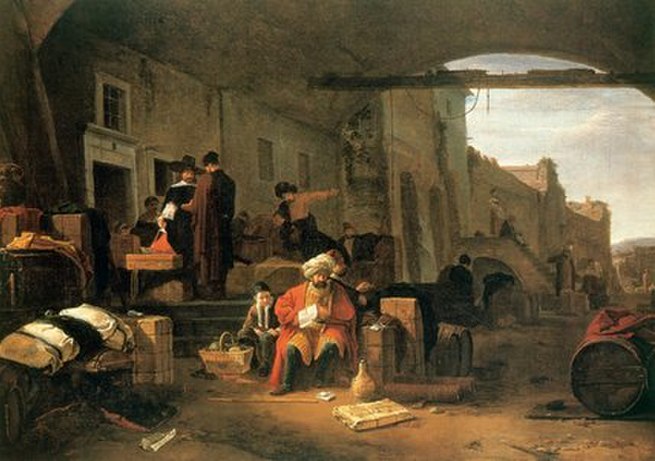
Main Difference
The main difference between Merchant and Vendor is that the Merchant is a businessperson who trades in commodities that were produced by others and Vendor is a enterprise that contributes goods or services
-
Merchant
A merchant is a person who trades in commodities produced by other people. Historically, a merchant is anyone who is involved in business or trade. Merchants have operated for as long as industry, commerce, and trade have existed. In 16th-century Europe, two different terms for merchants emerged: meerseniers referred to local traders (such as bakers and grocers) and koopman (Dutch: koopman referred to merchants who operated on a global stage, importing and exporting goods over vast distances and offering added-value services such as credit and finance.
The status of the merchant has varied during different periods of history and among different societies. In ancient Rome and Greece merchants could become wealthy, but lacked high social status. In contrast, in the Middle East, where markets were an integral part of the city, merchants enjoyed high status. In modern times, the term merchant has occasionally been used to refer to a businessperson or someone undertaking activities (commercial or industrial) for the purpose of generating profit, cash flow, sales, and revenue utilizing a combination of human, financial, intellectual and physical capital with a view to fuelling economic development and growth.
Merchants have been known for as long as humans have engaged in trade and commerce. Merchants and merchant networks operated in ancient Babylonia and Assyria, China, Egypt, Greece, India, Persia, Phoenicia, and Rome. During the European medieval period, a rapid expansion in trade and commerce led to the rise of a wealthy and powerful merchant class. The European age of discovery opened up new trading routes and gave European consumers access to a much broader range of goods. From the 1600s, goods began to travel much further distances as they found their way into geographically dispersed market-places. Following the opening of Asia to European trade and the discovery of the New World, merchants imported goods over very long distances: calico cloth from India, porcelain, silk and tea from China, spices from India and South-East Asia and tobacco, sugar, rum and coffee from the New World. By the eighteenth century, a new type of manufacturer-merchant had started to emerge and modern business practices were becoming evident.
-
Vendor
In a supply chain, a vendor, or a seller, is an enterprise that contributes goods or services. Generally, a supply chain vendor manufactures inventory/stock items and sells them to the next link in the chain. Today, these terms refer to a supplier of any good or service.
-
Merchant (noun)
A person who traffics in commodities for profit.
“trader”
-
Merchant (noun)
The owner or operator of a retail business.
-
Merchant (noun)
A trading vessel; a merchantman.
-
Merchant (noun)
A supercargo.
-
Merchant (verb)
As a resident of a region, to buy goods from a non-resident and sell them to another non-resident.
“a merchanting service”
-
Vendor (noun)
A person or a company that vends or sells.
-
Vendor (noun)
A vending machine.
-
Vendor (verb)
To bundle third-party dependencies with the source code for one’s own program.
“I distributed my application with a vendored copy of Perl so that it wouldn’t use the system copies of Perl where it is installed.”
-
Vendor (verb)
As the software vendor, to bundle one’s own, possibly modified version of dependencies with a standard program.
“Strawberry Perl contains vendored copies of some CPAN modules, designed to allow them to run on Windows.”
-
Merchant (noun)
a person or company involved in wholesale trade, especially one dealing with foreign countries or supplying goods to a particular trade
“a builders’ merchant”
“a tea merchant”
-
Merchant (noun)
a retail trader
“the credit cards are accepted by 10 million merchants worldwide”
-
Merchant (noun)
a person who deals in something unpleasant
“a merchant of death”
-
Merchant (noun)
(in historical contexts) a person involved in trade or commerce
“prosperous merchants and clothiers had established a middle class”
-
Merchant (noun)
a person who has a liking for a particular activity
“his driver was no speed merchant”
-
Merchant (adjective)
(in historical contexts) relating to merchants or commerce
“the growth of the merchant classes”
-
Merchant (adjective)
(of ships, sailors, or shipping activity) involved with commerce rather than military activity
“a merchant seaman”
-
Vendor (noun)
a person or company offering something for sale, especially a trader in the street
“an Italian ice-cream vendor”
-
Vendor (noun)
the seller in a sale, especially of property.
